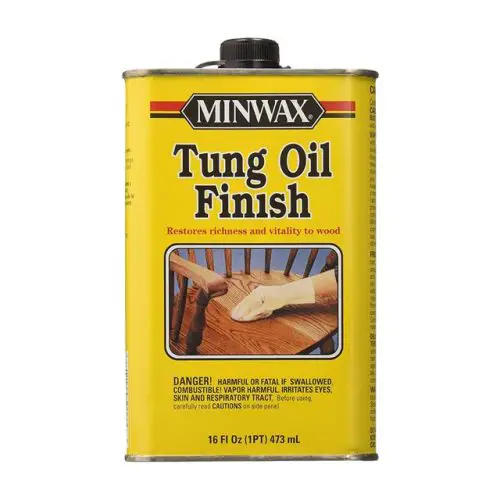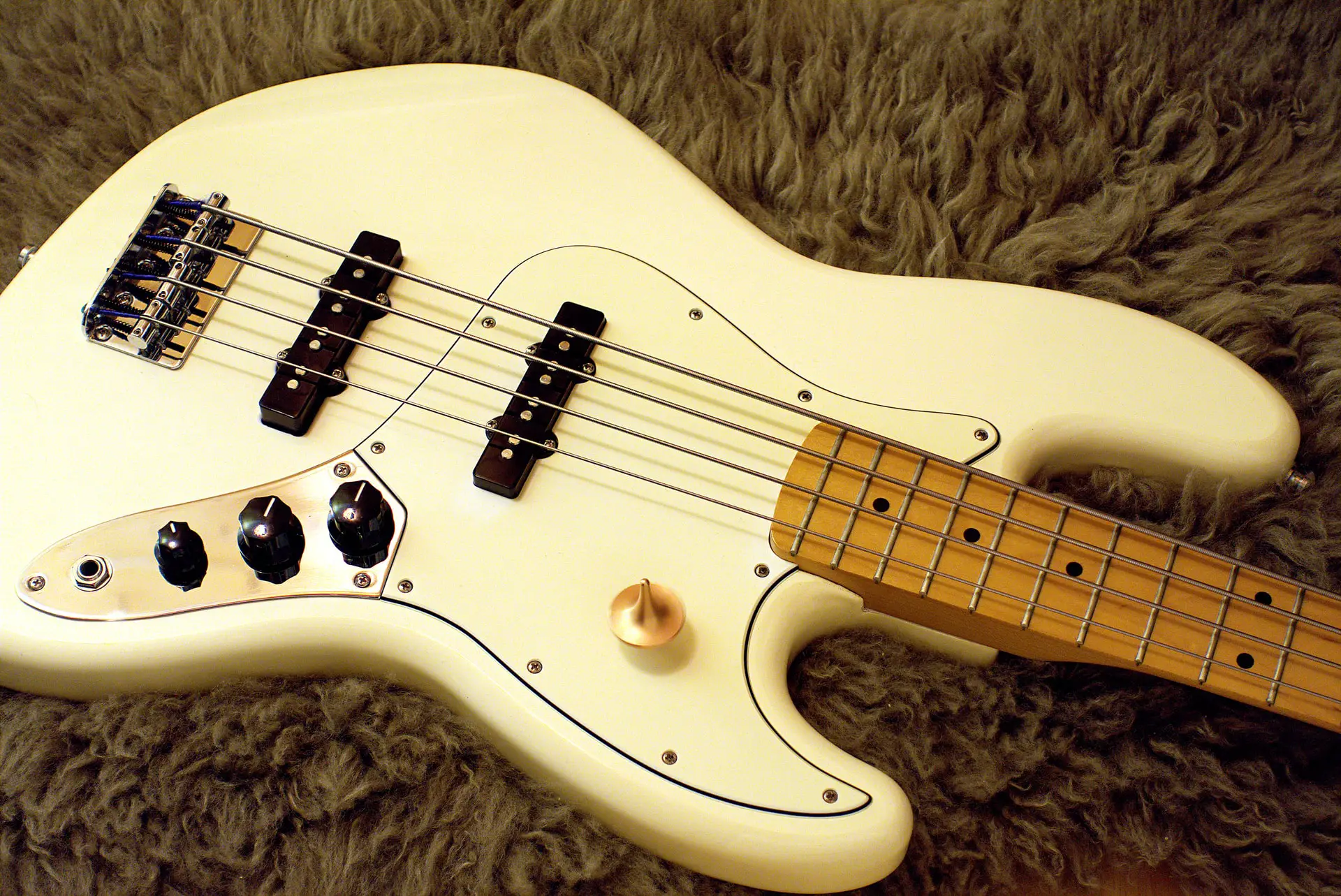Tung oil may not be the best choice for guitar if you seek a low-maintenance finish. This is because it will need to be reapplied as it is easily absorbed by your hands when you handle the guitar.
However, Tung oil is great if you want a natural looking finish on your guitar neck, fretboard and body (especially neck).
Although there are several wood finish options, you can choose from lacquer, Tru oil, and Tung oil. Tru oil gives a finish similar to varnish and is harder to touch. Lacquer finishes provide a lot of protection, whereas Tung oil provides the wood with a more natural feel.
Tung oil is extracted from the crushed seed of the Tung tree’s nut. Like linseed, safflower, poppy, and soybean oil, Tung oil is a drying oil. It leaves a durable, water-resistant surface that doesn’t brown with age when applied.
China wood oil is another name for Tung oil. It has been used to protect decorative and maritime wood and porous brickwork in China for hundreds of years.
I’ve had numerous musicians discuss which type of oil they should use on their guitar’s wood. Many people seem to prefer Tung oil, whereas numerous dislike it.
This article will explain whether Tung oil is suitable for a guitar and how you can oil different parts of your guitar. Here are the topics we will cover in this article:
- Is Tung Oil Good for Guitar?
- What Does Tung Oil Do for Wood?
- Is Tung Oil Good for Guitar Necks?
- Can I Use Tung Oil on a Guitar Fretboard?
- How Do You Apply Tung Oil a Guitar Neck?
- Pure Tung Oil Vs Modified Tung Oil
Is Tung Oil Good for Guitar?
Tung oil may not be the best choice if you seek a low-maintenance finish. This is because it will need to be reapplied as it is easily absorbed by your hands when you handle the guitar. You might even feel your forearm rubbing the oil off the instrument’s body.
The protection Tung oil provides to a guitar isn’t exceptionally high. Although it’s better to use Tung oil than using nothing at all. Nevertheless, long-term durability isn’t one of its strong suits.
Another thing to remember is that Tung oil-finished guitars are prone to getting dirty since dirt can still enter the wood’s pores. It’s essential to maintain your guitar clean because there’s nothing you can do once the dirt has settled in except sand away as much as you can and start over.
Related article: Relicing Maple Neck To Darken Yellow: How To (Poly & Nitro)

Tung oil can provide a natural glossy finish.
What Does Tung Oil Do for Wood?
Tung oil is made from the extract from Tung tree nuts. It’s a natural drying oil that leaves a translucent, moist finish on your guitar’s wood. It enhances the color of your wood while also providing a decent amount of protection while being environmentally friendly.
On light-colored timbers, the difference in stain color between the two varieties of Tung oil is highly noticeable. Pure Tung oil lends a yellow or pale yellow ochre tint to the light-colored ones. On the other hand, dark Tung oil dramatically darkens the color of the wood. It produces a mahogany brown tint in this situation.
Before adding a Tung oil finish, wait at least 12 hours after applying the oil-based wood stain. Buff the last coat with a fine steel-wool pad to achieve a high sheen. Clean with a gentle buffing cloth and buff. Tung oil can be used as a sealant and a top coat before applying the wood stain.
Is Tung Oil Good for Guitar Necks?
Tung oil is good for guitar necks if you want to achieve a more natural-looking finish because of the way it absorbs into the wood. This is especially true on a guitar’s neck, where the grain of the wood can be felt in your hands when you move it up and down.
As your palm usually brushes over the neck of the guitar when you play, having a smooth finish that feels nice to the touch is essential. Tung oil is excellent for use on guitar necks as the finish is smooth and gives you that natural wood feel when you play, which many guitarists love.
Can I Use Tung Oil on a Guitar Fretboard?
Using a finishing oil on the fretboard is usually not recommended. However, using Tung oil on the fretboard will give you a much smoother finish akin to the ones in Fender electric guitars.
It naturally won’t improve your playing ability, but the surface will feel smooth to the touch, which can improve upon the experience.
If you plan to use Tung oil on the fretboard, use 100% uncooked, pure Tung oil rather than processed finishing Tung oils. This will help restore the natural look and feels closer to a rosewood finish. When using it for the finish, ensure to apply it sparingly so it won’t harden and build up.
How Do You Apply Tung Oil to a Guitar Neck?
To apply Tung oil on a guitar neck, make sure to add mineral spirit to the Tung oil before applying – as it helps the Tung oil soak into the wood better.
The surface of the guitar neck might look glossy for a few minutes, but as the oil absorbs into the wood, it will dry to a flat sheen.
Apply the Tung oil in light coats. Apply 2-3 applications of pure Tung with a rag or sandpaper, allowing each coat to dry for at least a few hours, preferably 24 hours. 000 steel wool can be used to polish between coatings.
Tung oil is fantastic for finishing since it gives the guitar a gorgeous tint if you use enough coats. It’s best to use sandpaper to apply the Tung oil on the guitar neck.
Sandpaper creates sanding dust, which mixes with the oil and fills the holes and grains, resulting in a smooth surface.
Here’s a great YouTube video showing you how to apply Tung oil on a guitar neck.
Pure Tung Oil Vs Modified Tung Oil
Pure Tung oil is not the same as modified Tung oil. It dries quickly and takes fewer coats to build up. It’s ideal for a wide range of projects, including guitar necks. Necks that have been oiled are more comfortable and faster to play.
Pure Tung oil has no expiration date, whereas polymerized Tung oil does. Regardless of which type of Tung oil you’re using, you’ll need to reapply for Tung oil at least every 6 months. Tung oil finish is also prone to dust accumulation in the wood’s pores, so it’s essential to keep the guitar clean.
Conclusion
An excellent finish makes your guitar look beautiful and improves your playing experience. Although you can have many types of finishes on your guitar’s wood, Tung oil provides a more natural-looking finish.
I hope this article helped you understand the properties of Tung oil better and helped you decide whether it can be a good finish for your guitar.





